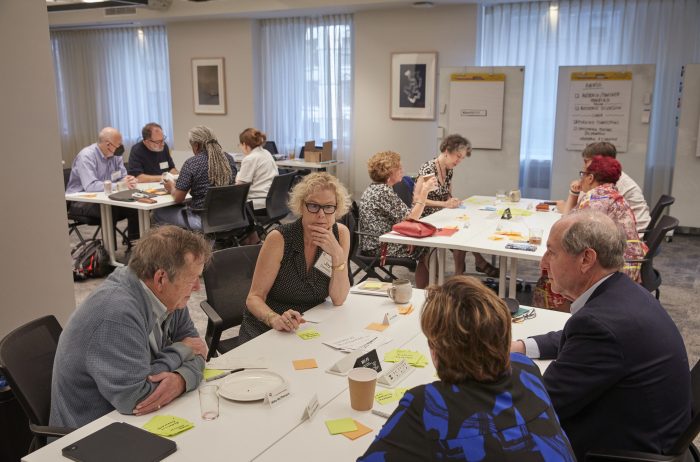ACLS Community Message for September 2024

I’m proud to say that ACLS has increased its reach over the past five years, and in the coming five years, my goal is to continue that trend. Our growth reflects our determination to support the full range of humanistic scholars and scholarship—from archival research to digital, experimental, and community-facing projects, transdisciplinary exploration to foundational study in the disciplines—in conditions increasingly hostile to open-ended inquiry and debate, where higher education has come to be viewed as the key to individual success rather than as a collective good.
Humanistic inquiry is conducted in countless places in the world, and this is both a wonder and a challenge for us at ACLS. A curious optimist by nature, I’m excited about the potential of a community that embraces college and university faculty, students, and administrators, academic society executive directors and staff, PhDs working in a range of professions beyond academia, librarians, JDs and MFAs, MPPs and MPAs, curators and conservators, fellow regional and national higher ed organizations, state humanities councils, K-12 teachers and administrators, community centers and archives, historic sites and parks, museums, think tanks, tribal councils, reading groups, and more. ACLS will be clear and candid about our priorities, identifying the groups we are best placed to serve directly and the activities we are best suited to carry out while keeping our ears open for new ideas and partners and setting a table where everyone is welcome.
Our current programs and initiatives serve the community of professional scholars, mainly in the United States, defined as people who are working toward or who have attained an advanced degree in the humanities and social sciences and eligibility for membership in a learned society. Most work in academia, but not all. We are keenly aware that funding for humanistic scholarship is scarce. Just as we fund scientists undertaking the meticulous daily work of small projects that make new discoveries possible, we must fund humanists and interpretive social scientists to do the work that improves our understanding of human behavior past and present, whether for its own sake, to enrich our lives, or to nudge social progress.
Clearly, scholars and the academic societies that serve them have seats at the ACLS table. But it’s got to be bigger than that. Surveys by Humanities Indicators (housed at the American Academy of Arts and Science) show that Americans are hungry for knowledge about history, politics, art, and culture. But few connect these experiences with higher education. Perceptions of what students want and what serves the market drive decision-making in many institutions: as we saw last year at West Virginia University and other institutions, mathematics is on the chopping block right next to languages and literature.
Americans aren’t going to decide that the humanities and social sciences (or math or astrophysics) are valuable just because faculty say they are. A gap has opened up between academic study and the knowledge people want and need. Working with others, we can close it.
Over the past five years, ACLS has built an array of relationships, gathering groups to assess curricula, job market preparation, and diversity within China studies and art history programs in North America; to foster community across Buddhist studies programs internationally; to establish support networks for community college faculty and emerging scholars; to make recommendations on scholars’ needs and professional norms; and to strategize about effective advocacy. Expanding the ACLS table with a focus on bringing together funders and people outside academia will move us forward, step by step, toward the culture change necessary to begin to reverse decades of American underinvestment in humanistic inquiry.
In the coming months, I will work with my colleagues, the Board, our partners in the learned societies and member institutions, and other interlocutors to consider how best to cast our net, to build the alliances that will be most effective in our effort to create conditions where the full range of humanistic scholarship can thrive. I believe our survival and flourishing depend on the knowledge we create and produce, not in competition but in partnership with the sciences, law, and other fields: knowledge of how we communicate with one another, of our various pasts and social norms, the ways we reason and judge, our boundless capacity to make meanings out of words, gestures, and images. This knowledge, this expertise with words, facts, and dreams, frees our imaginations to envision a different and better world. This is the crucial work humanists and social scientists do – the work that the world needs. I want to find ways to shout this more loudly from the rooftops, and the right allies to help us shout.
As always, I welcome your feedback, and I send best wishes for the new academic year!

Joy
A poem to read during the hectic rush of the start of the academic year. My thanks to Professor Xiaorong Li of UC Santa Barbara for the recommendation.
Tranquil Repose
By Sikong Tu (translated by Herbert Giles)
It dwells in quietude, speechless,
Imperceptible in the cosmos,
Watered by the eternal harmonies,
Soaring with the lonely crane.
It is like a gentle breeze in spring,
Softly bellying the flowing robe;
It is like the note of the bamboo flute,
Whose sweetness we would fain make our own.
Meeting by chance, it seems easy of access,
Seeking, Ever shifting in semblance,
It shifts from the grasp and is gone.

